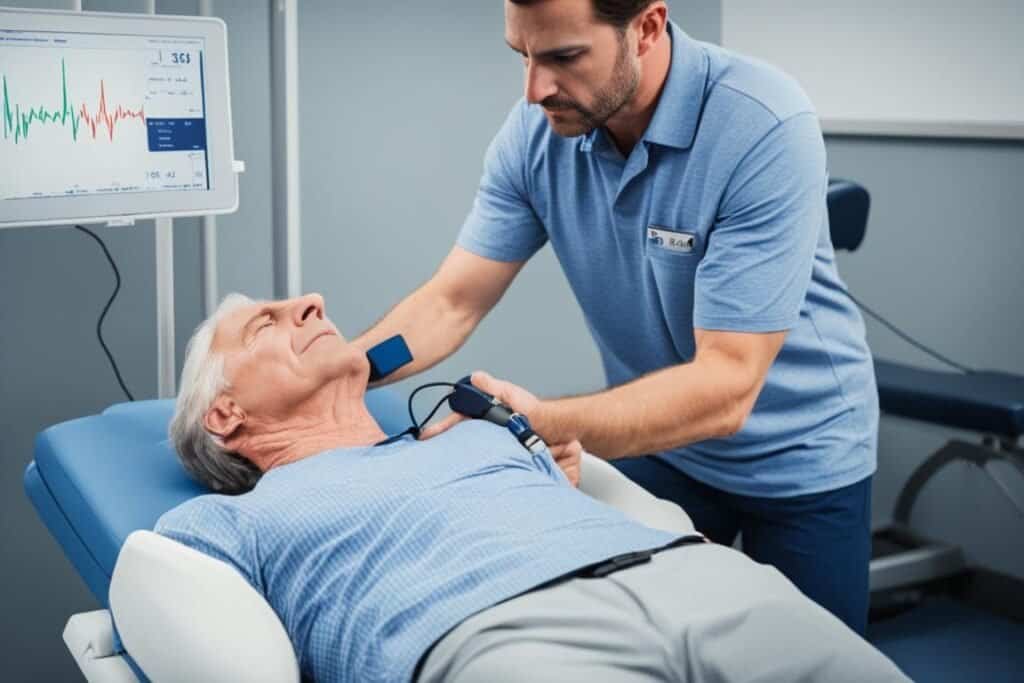An electrocardiogram (ECG) is a test that records the electrical activity of the heart. Lying still during an ECG test is crucial for accurate results.
The electrical signals produced by the heart are measured through small patches called electrodes that are attached to various areas of the body. Any movement during the test can alter the results and lead to inaccurate readings. It is important to remain motionless to ensure the ECG captures the true electrical activity of the heart and allows for an accurate diagnosis of heart conditions or abnormalities.
Key Takeaways:
- Lying still during an ECG test is essential for accurate results.
- Movement during the test can alter the electrical signals recorded by the electrodes.
- Remaining motionless ensures the ECG captures the true electrical activity of the heart.
- An accurate ECG allows for a proper diagnosis of heart conditions.
- Following tips for staying still during an ECG can contribute to accurate results.
How an ECG is Done and the Importance of No Movement
During an electrocardiogram (ECG), the patient lies down on a table while electrodes are attached to their arms, legs, and chest. These electrodes are connected to a machine that records the electrical signals produced by the heart. It is important for the patient to remain completely still during the test to ensure accurate results.
Any movement, no matter how small, can have significant effects on the ECG readings. Even shivering or slight shifts in position can interfere with the test and lead to distorted tracings. These artifacts make it challenging for healthcare professionals to accurately interpret the results and may impact the diagnosis and treatment plan.
“During an ECG, even the tiniest movement can result in distorted readings, making it difficult for healthcare professionals to accurately interpret the results.”
Artifacts caused by movement can mimic abnormal electrical activity in the heart, leading to false positives or false negatives. This can potentially cause unnecessary further testing or failure to detect underlying heart conditions. By remaining still during the procedure, patients can help ensure the highest level of accuracy in their ECG test results.
The Effects of Movement on ECG Results
Movement during an ECG can have several effects on the test results:
- Distorted tracings: Even slight movements can create artifacts on the ECG, making it difficult to decipher the true electrical activity of the heart.
- Misinterpretation: The presence of artifacts can lead to misinterpretation of the results, potentially masking underlying heart conditions or indicating abnormalities where none exist.
- Diagnostic errors: Movement-induced artifacts can result in misdiagnosis or failure to detect cardiovascular abnormalities, delaying appropriate treatment and management.
Therefore, it is crucial for patients to understand and follow the instructions provided by the healthcare professionals conducting the ECG, emphasizing the importance of remaining completely still throughout the procedure.
| Effects of Movement on ECG Results | Potential Consequences |
|---|---|
| Distorted tracings | Difficulty in accurately interpreting the electrical activity of the heart |
| Misinterpretation | False positives or false negatives, leading to inappropriate further testing or failure to detect heart abnormalities |
| Diagnostic errors | Misdiagnosis or delayed detection of cardiovascular conditions, hindering timely treatment and management |
The Significance of No Movement on ECG Accuracy
Remaining still during an ECG is crucial for achieving accurate results and maintaining the overall accuracy of the test. Movement can introduce noise into the electrical signals recorded by the electrodes, making it challenging to identify any abnormalities or irregularities in the heart’s electrical activity. To ensure no movement during the ECG test, here are some useful tips:
- Be relaxed and warm: Being in a relaxed and comfortable state can help minimize any potential movement during the test. Shivering or discomfort can impact the accuracy of the results, so it’s important to stay warm and calm.
- Hold your breath: Healthcare providers may instruct you to hold your breath for a few seconds during specific parts of the test. This helps minimize any potential movement and ensures clearer results.
By following these tips, you can contribute to the accuracy of the ECG test and enable healthcare professionals to accurately assess your heart’s electrical activity. It’s important to remember that remaining still during the test is crucial for achieving reliable results and ensuring proper diagnosis and treatment.
To visually illustrate the significance of remaining still during an ECG, take a look at the image below:
Impact of Movement on ECG Results
Movement during an ECG test can have a significant impact on the accuracy of the results. Even minor movements, such as talking or fidgeting, can distort the electrical signals recorded by the electrodes. This can lead to misinterpretation of the ECG tracings, potentially masking underlying heart conditions or falsely indicating abnormalities. Remaining motionless during the test is crucial for obtaining a clear and accurate depiction of the heart’s electrical activity, ensuring that any potential issues are properly detected and diagnosed.
- Enhanced ECG Accuracy: By eliminating movement, the accuracy of the recorded electrical signals is greatly improved. This allows healthcare professionals to make more precise interpretations and detect even subtle abnormalities in the heart’s electrical activity.
- Minimized Artifacts: Movements during the ECG test can introduce artifacts, which are undesired signals that can obscure the true ECG waveform. Remaining still helps minimize the presence of artifacts, ensuring a clean and accurate ECG reading.
- Accurate Diagnosis: Accurate ECG results play a crucial role in the diagnosis of various heart conditions. By being motionless during the test, you increase the likelihood of obtaining reliable results that can aid in identifying and effectively managing any underlying heart issues.
It is important to understand that every small movement can impact the accuracy of the ECG results. By following instructions and consciously staying still, you can contribute to the overall effectiveness of the ECG test and ensure that any potential heart conditions are accurately diagnosed and treated.
Tips for Staying Still During an ECG
Ensuring minimal movement during an electrocardiogram (ECG) is essential for obtaining accurate test results. Even the slightest motion can interfere with the electrical signals recorded by the electrodes, potentially leading to distorted readings. To help you remain still during an ECG, here are some useful tips:
- Relax and stay calm: Before and during the procedure, try to relax your body and mind. Take deep breaths and focus on maintaining a peaceful state.
- Breathe slowly and deeply: Concentrate on your breathing, taking slow and deep breaths. This can help minimize any unintentional movement caused by rapid or shallow breathing.
- Avoid unnecessary talking: Engaging in conversation during the test can introduce movement. Instead, follow instructions and limit conversation to only essential communication with the healthcare provider.
- Inform the healthcare provider: If you experience any discomfort or have the urge to move, inform the healthcare professional conducting the test. They can assist you and ensure the accuracy of the results.
- Choose comfortable clothing: Dress in loose and comfortable attire for your ECG test. Avoid wearing tight or restrictive clothing that may cause discomfort or induce fidgeting.
- Manage shivering: If you tend to shiver, request a warm blanket or ask for the room temperature to be adjusted before the test begins. This can help alleviate any involuntary movement caused by cold temperatures.
- Follow instructions: Pay close attention to the guidance provided by the healthcare professional conducting the ECG. They may ask you to hold your breath for short periods or make other specific requests to minimize movement and ensure accurate results.
By following these tips, you can enhance the accuracy of your ECG test and assist healthcare professionals in effectively diagnosing and managing potential heart conditions or abnormalities.

Remember, remaining motionless throughout an ECG is vital for obtaining reliable results. Any movement during the test can impact the accuracy of the recorded electrical signals. By implementing these strategies, you can contribute to the overall effectiveness of the ECG and help healthcare providers accurately assess and treat your heart health.
The Role of ECG in Diagnosing Heart Conditions
An electrocardiogram (ECG) is a powerful diagnostic tool used to detect and diagnose various heart conditions and abnormalities. By accurately recording the electrical signals produced by the heart, ECG helps healthcare professionals identify potential issues and determine the appropriate course of treatment.
During an ECG, it is crucial for patients to remain still to ensure the accuracy of the recorded electrical signals. Any movement can interfere with the test and result in distorted readings, potentially leading to misdiagnosis or the failure to detect underlying heart conditions.
An abnormal ECG can indicate a range of heart conditions, including heart disease, abnormal heart rhythm, heart defects, coronary artery disease, heart valve disease, or an enlarged heart. However, it is important to note that a normal ECG does not necessarily rule out the presence of an underlying heart condition. Further testing may be required if a patient presents with symptoms or risk factors for heart disease, even if the initial ECG appears normal.
To better understand the significance of ECG accuracy in diagnosing heart conditions, let’s take a closer look at some common conditions that can be detected through an ECG:
- Heart Disease
- Abnormal Heart Rhythm
- Heart Defects
- Coronary Artery Disease
- Heart Valve Disease
- Enlarged Heart
Remember, accurate ECG results play a crucial role in the proper diagnosis and management of heart conditions. By understanding the importance of lying still during an ECG test and ensuring its accuracy, you can contribute to the effectiveness of this vital diagnostic tool in assessing heart health.
Importance of Accurate ECG Results
Accurate ECG results play a crucial role in the proper diagnosis and management of heart conditions. During an ECG test, the electrical signals produced by the heart are recorded and analyzed by healthcare professionals to identify any abnormalities or irregularities in the heart’s functioning.
These results provide valuable insights that guide the appropriate course of treatment and help in monitoring the effectiveness of interventions. However, the accuracy of ECG results heavily relies on the patient’s ability to maintain stillness during the test.
Movement during an ECG test can introduce errors and artifacts into the recorded electrical signals, compromising the accuracy and reliability of the results. Any deviation from a motionless state can lead to misdiagnosis or a failure to detect underlying heart issues.
To illustrate the impact of movement on ECG accuracy, consider the following scenario:
| Case | Effect of Movement |
|---|---|
| Case 1: Motionless Positioning |
|
| Case 2: Movement during the Test |
|
As depicted in the table above, remaining motionless during an ECG test is vital for obtaining accurate and reliable results. It ensures that the recorded electrical signals truly reflect the heart’s activity, enabling healthcare professionals to make informed decisions regarding diagnosis, treatments, and overall care.
By understanding the significant impact of movement on ECG accuracy, patients can actively contribute to the reliability and effectiveness of this diagnostic tool.

Conclusion
Lying still during an ECG test is crucial for obtaining accurate and reliable results. Any movement during the test can have a significant impact on the accuracy of the recorded electrical signals, which can lead to misdiagnosis or a failure to detect underlying heart conditions. It is essential for patients to understand the importance of remaining motionless during the procedure, as this helps maintain the overall accuracy of the ECG and ensures that any abnormalities or irregularities in the heart’s electrical activity are properly identified and managed.
By following the tips for staying still during an ECG, patients can contribute to the effectiveness of this diagnostic tool in assessing heart health. Relaxing and focusing on your breathing can help minimize any potential movement. Avoiding unnecessary conversation and discomfort, and requesting a warm environment, can also assist in maintaining stillness throughout the test. It is equally important to follow the instructions provided by the healthcare professional conducting the ECG, including holding your breath when asked. Together, these efforts can help ensure accurate and reliable ECG results.
Accurate ECG results are vital for the proper diagnosis and management of heart conditions. The electrical signals recorded during an ECG provide valuable insights into the functioning of the heart, allowing healthcare professionals to identify abnormalities and determine the appropriate course of treatment. By understanding the significance of lying still during an ECG test and taking the necessary precautions, patients empower themselves to contribute effectively to their own heart health and ensure the accuracy of their diagnostic tests.

